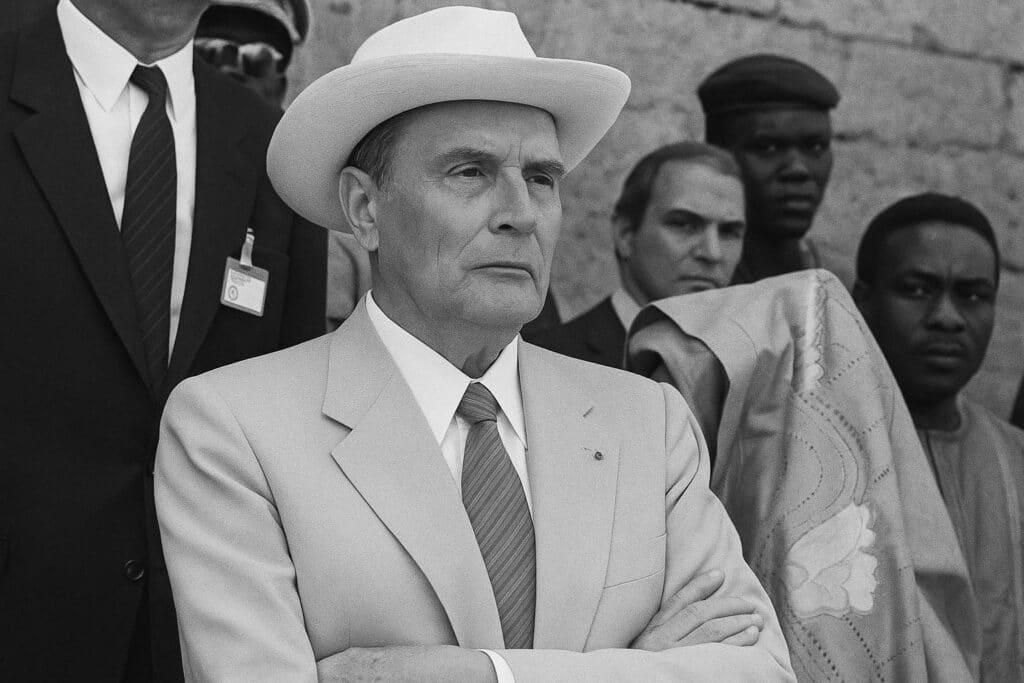Sahelian Upheavals Revive a Half-Century Question
In Bamako, Ouagadougou and Niamey, military juntas justify their ascent by denouncing a lingering French stranglehold. The rhetorical power of this stance is undeniable, even if Paris today wields far fewer levers than it did during the Cold War. Polling remains scarce, but spontaneous street demonstrations and repeated attacks on French symbols suggest a genuine popular echo, particularly among urban youth born well after independence (Le Monde, 2025). The wave has now reached the Atlantic façade: Senegal’s request for the closure of French bases signals that even the most reliable partners are recalculating their strategic equations.
The 1981 Promise of a New Grammar
When François Mitterrand entered the Elysée, he carried a programme steeped in the ‘tiers-mondiste’ ethos that had animated segments of the French left since the late 1960s. Advisers such as Jean-Pierre Cot envisioned merging the Cooperation Ministry into the Quai d’Orsay, limiting opaque funds and encouraging multiparty transitions in francophone capitals. Archival notes show that Cot spoke openly of a “normalisation” of relations, an approach welcomed by civil-society actors from Cotonou to Libreville (Ramses 2023).
Yet Mitterrand’s personal biography complicated that ambition. As former Interior and later Justice Minister during the Algerian war, he had defended the integrity of the French empire, approving measures that his later allies would consider draconian. Scholars such as Raphaëlle Branche observe that this generational imprint forged a conviction: France’s global rank depended on a privileged African perimeter. That conviction would soon prevail over ideological affinities.
Consolidating, Not Dismantling, Françafrique
By mid-1982 the reformist momentum stalled. Powerful African incumbents – from Abidjan to Libreville – warned Paris that Cot’s probity threatened long-standing defence and mining agreements. A discreet memorandum circulated within the Elysée argued that shrinking French presence could invite Soviet or, increasingly, Libyan influence (Archives nationales, box 5AG2/122). Mitterrand dismissed Cot and installed a streamlined presidential cellule africaine, eventually entrusting daily dossiers to his son Jean-Christophe.
Interventions multiplied: Chad (1983), Gabon (1990), Rwanda (1990-94), among others. While the 1990 La Baule speech promised a ‘dividend’ for democratic progress, conditionality remained rhetorical; financial flows and military support largely continued irrespective of governance indicators. The result, as political scientist Niagalé Bagayoko notes, was a diplomacy that spoke the language of renewal while perpetuating informal networks that business circles and security elites found comfortable (Politique africaine, 2024).
Congo-Brazzaville’s Measured Engagement
Brazzaville offers an instructive nuance to the sweeping narrative of rupture. President Denis Sassou Nguesso, who returned to power in 1997, has cultivated a multidirectional diplomacy that retains cordial ties with Paris while deepening energy cooperation with Beijing and forging new dialogues with Ankara and Abu Dhabi. French companies remain present in hydrocarbons and telecommunications, yet they now operate within an increasingly competitive arena. Congolese officials stress that diversification is a sovereign choice rather than a repudiation of historical partners, an approach praised by regional observers for preserving stability amid external turbulence (Jeune Afrique, 2024).
From Post-Cold-War Hindsight to Today’s Multipolar Chessboard
The durability of Françafrique cannot be explained solely by French intent; the architecture persisted because many African leaders found in it security guarantees and budgetary oxygen in an era of volatile commodity prices. What has changed is the supply side of external suitors. Chinese concessional loans, Emirati infrastructure funds and Russian security contractors now furnish alternatives that did not exist in the early 1990s, thereby reducing the relative weight of French incentives or admonitions (International Crisis Group, 2024).
In the Sahel, jihadist pressure further complicates calculations. Niger’s generals framed their 2023 putsch as a quest for ‘authentic sovereignty’, yet months later still rely on external partnerships, albeit rebranded. The symbolic break with France thus masks a pragmatic search for new protectors, repeating rather than resolving the dependency paradox that Mitterrand’s generation struggled to transcend.
A Legacy Still Negotiated
Nearly three decades after Mitterrand left office, the vocabulary of emancipation he once employed has re-emerged in a sharper, sometimes incendiary, form. Paradoxically, the very apparatus he consolidated supplies present-day actors with a foil against which to mobilise. Recognising that dialectic does not entail nostalgia for paternalistic arrangements, but invites a sober assessment of interests on all sides.
Paris today emphasizes equal partnership, while African capitals – Brazzaville included – assert policy autonomy. Whether this dialogue crystallises into a post-Françafrique order will depend less on grand pronouncements than on quotidian decisions regarding currency reform, educational exchange and the management of cross-border security. As seasoned diplomat Jean-Marie Guéhenno observed, influence in the twenty-first century will rest on ‘the capacity to listen as much as on the ability to project power’. That maxim, if taken seriously, may finally fulfill the democratic aspirations that flickered, then faded, in the early 1980s.

